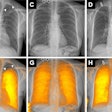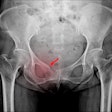Dual-energy x-ray absorptiometry (DEXA) scans have shown that even patients with normal body mass index (BMI) scores may experience significant drops in bone health, according to a study conducted by researchers in Korea.
A group led by Hyunjung Yoon, MD, of Sungkyunkwan University in Seoul, studied DEXA measurements of body fat composition in patients with normal BMI and found decreases in bone mineral density (BMD).
“This could lead to significant implications for the development of effective preventive strategies for osteoporosis,” the researchers wrote, in a study published October 14 in Scientific Reports.
The “obesity paradox” is a concept based on evidence in some patients that obesity may be a protective factor against osteoporosis, the authors explained. The concept has been a source of confusion in metabolic studies and suggests that connections between body fat and bone tissue remain unclear, the authors wrote.
Moreover, BMI does not provide details on the composition of body fat. Rather, it is a measurement based on a person’s total weight and height, they noted.
To shed light on these issues, the researchers collected data on 3,904 patients who underwent DEXA exams in a previous study between 2012 to 2019. They measured body fat percentages (which indicate body fat alone) in patients and compared decreases over time in BMD in those with normal BMI and normal adiposity (NBMI-NA) and normal BMI and high adiposity (NBMI-HA).
Decreased BMD was defined as a DEXA Z-score (a score determined by comparing a patient’s BMD with that of the average from the same age group and gender) of less than −2.0 in premenopausal women and men younger than 50 years of age or a T-score (a score obtained by comparing a patient’s BMD with that of healthy young adults) less than −1.0 in postmenopausal women and men over 50 years of age.
According to the findings, the incidence of decreased BMD in the normal adiposity group was 3.37, and in the high adiposity group was 4.81, which was the highest among all groups, the researchers wrote. Also, after adjusting for confounding factors, high adiposity led to a significantly greater risk of decreased BMD compared with normal adiposity (hazard ratio: 1.47, with 1 as reference).
“To the best of our knowledge, this is the first retrospective cohort study confirming the association between body fat and decreased BMD in Korean adults, including not only menopausal women but also men and premenopausal women,” the group wrote.
Following the start of the COVID-19 pandemic, many individuals' weights increased due to reduced physical activity, overeating, and increased stress, the authors noted. As a result, there has been an increase in the number of individuals attempting to manage their health, with most simply focusing on BMI, they wrote.
“The results of this study confirm that focusing on a healthy body composition, not simply BMI, is more important in preventing decreased BMD,” the researchers concluded.
The full article can be found here.



















